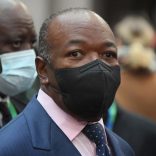Africa’s second-largest oil exporter may turn to the IMF amid oil price slump
Equatorial Guinea: President declares 3 days of national mourning

Photo: Lusa
Equatorial Guinea has officially declared three days of national mourning, starting on Wednesday, for the victims of the explosions in Bata and has provided €15.2 million to respond to the disaster in which 105 people died.
“Three days of mourning are declared throughout the national territory during 10, 11 and 12 March,” according to a decree signed by the president, Teodoro Obiang Mbasogo, dated Tuesday, the day he visited the area of the explosions.
The head of state declared the city of Bata a disaster zone, ordering urgent measures to protect those affected and repair the damage caused by the explosions, which occurred in the Nkuatama military base, causing the destruction of public buildings and over a hundred private homes within a kilometre radius.
According to the most recent statement by the authorities, the explosions caused 105 deaths and 615 wounded, 133 of whom are still in hospital in this port city, situated on the mainland of Equatorial Guinea.
The decree provides for the release of an initial fund of 10 billion CFA francs (about €15.2 million) to meet emergency financial needs.
The so-called Emergency Fund to Respond to the Bata Catastrophe will be managed by the National Emergency Committee, chaired by the Interior Ministry.
“The government is deeply concerned about the situation caused by the explosions, which have triggered a state of catastrophe that adds to the health emergency caused by the coronavirus pandemic,” the government said.
According to the Malabo authorities, assessments are continuing with a view to a regular update of the damage caused by this unfortunate accident, which will determine the response capacity through the appropriate allocation of available national resources and the support of international assistance, if necessary.
In parallel, the decree adds, the government is redoubling efforts to fully clarify the events and responsibilities in this accident.
Two human rights non-governmental organisations (NGOs) on Wednesday called for an independent investigation into Sunday’s explosions.
Human Rights Watch (HRW) and EG Justice, a group promoting human rights and good governance in Equatorial Guinea, also argued that, given the high levels of corruption in the country, donors and support groups should send aid directly to those affected rather than to the government.
“The residents of Bata are suffering. They deserve credible answers about what happened and immediate support to treat the injured, shelter the displaced and rebuild the city. The only way to achieve this is through an independent investigation and international aid delivered directly to those affected,” said EG Justice director Tutu Alicante.
“Regardless of what caused the explosion,” the population deserves “to know why the military is storing explosives in the middle of a populated area, whether there are other substances stored that could be an imminent public risk, and what the government is doing to prevent a similar explosion in the future,” said HRW senior business and human rights researcher Sarah Saadoun.
Immediately after the explosions, Equatorial Guinea’s President Teodoro Obiang said he had asked the courts to conduct an investigation, saying the cause was burning on nearby land by neighbours and the negligence of the unit in charge of protecting the explosives.
In the same statement, Obiang cited economic difficulties and falling oil prices due to the Covid-19 pandemic as a reason to call for international aid.
A former Spanish colony ruled for 42 years by Teodoro Obiang, Equatorial Guinea, a country rich in resources but with large swathes of the population below the poverty line, has been part of the Community of Portuguese Language Countries (CPLP) since 2014.
Since independence from Spain in 1968, Equatorial Guinea, one of Africa’s top oil producers, has been regarded by human rights groups as one of the world’s most repressive countries due to accusations of detentions and torture of dissidents and allegations of electoral fraud.
Obiang, 78, has ruled the country with an iron fist since 1979 when he overthrew his uncle Francisco Macias in a coup and is the world’s longest-serving president.













Leave a Reply
Be the First to Comment!
You must be logged in to post a comment.
You must be logged in to post a comment.